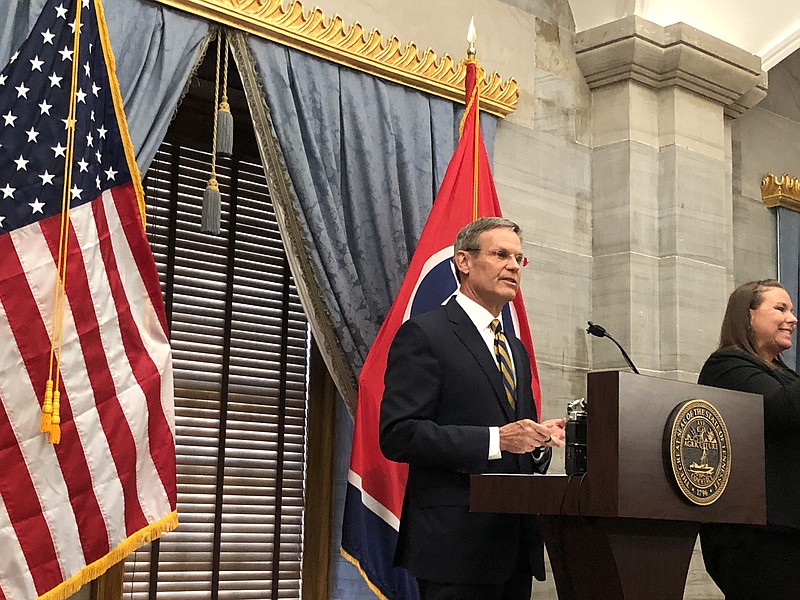NASHVILLE - Gov. Bill Lee said he is giving "serious consideration" to calling Tennessee legislators back to the state Capitol for a special session after the failure last week of a bill providing businesses, schools, churches and other organizations more legal protection against COVID-19 liability lawsuits.
"I'm evaluating the best way to provide these protections for our businesses and that certainly includes a serious consideration of a special session," the Republican governor told reporters Tuesday.
Saying a special session is "a tool that's reserved for extraordinary circumstances," Lee added that "protecting Tennessee's small businesses and organizations and churches and schools is certainly an extraordinary circumstance. And we'll be looking to consider that decision."
But Lee said that before he makes any decision "it's my hope that productive conversations will happen at the legislative level and those conversations will resume because they have to in order for there to be a successful session and a quick session."
The Republican-led House and Senate ended the session at 3 a.m. CDT Friday when the bill pushed by a 30-group coalition spearheaded by the Tennessee Chamber of Commerce & Industry went down in flames on the House floor amid questions over its constitutionality.
It received 46 of the 50 votes required for passage, with a top Republican, Majority Leader William Lamberth, a Portland attorney in a county in which multiple lawsuits have been filed against a nursing home where 23 people died of COVID-19, openly criticizing it on the floor as going too far.
His and other House members' concerns focused on the bill's retroactive provision seeking to provide additional protection to entities dating back to Tennessee's first known case of COVID-19 on March 5.
Critics charged it violated the Tennessee Constitution's Article 1, Section 20. It states: "That no retrospective law, or law impairing the obligations of contracts, shall be made."
But proponents argued a prior Tennessee court ruling opens the door to retroactive laws. The bill itself did not provide absolute protection from lawsuits. But it did raise the legal standard to filing suit in a COVID-19 case to "gross negligence and willful misconduct," a high barrier to overcome.
Senate Judiciary Committee Chairman Mike Bell had previously acknowledged making it state law was a legal risk, but it was one that he said was worth taking. Bell also noted that severability clauses would allow a judge to strike down the retroactive language, but others continued to raise questions.
After the bill failed, the Senate moved to adjourn and left smoldering on its agenda a telemedicine bill sponsored by Rep. Robin Smith, R-Hixson. It sought to provide "payment parity" on insurance reimbursements between similar in-person and teleconferencing encounters between patient and health care provider.
The death of both bills spurred a furious blast by Lt. Gov. Randy McNally, the Republican speaker from Oak Ridge, at the House. It's the first rift between McNally and the relatively new House Speaker Cameron Sexton, a Crossville Republican elected to the post in 2019.
McNally charged later Friday that "the failure of the House to pass legislation protecting our state's businesses has created an opportunity for trial lawyers seeking a payday to disrupt our economy and put people out of work."
And in a blast at Lamberth and the bill sponsor, House Judiciary Committee Chairman Michael Curcio, R-Dickson, McNally said they "cobbled together a cabal of Democrats and attorneys to defeat the legislation and place our entire economy in danger. It was irresponsible and dangerous.
"I would absolutely support a call for a special session by our governor for this issue and this issue alone," McNally added.
Senate leaders, Sexton later told the Times Free Press, were warned there were problems after a Senate and House conference committee left intact the retroactive protection to business owners.
"So we put it up for a vote, tried to communicate and we were hopeful they would take up the telemedicine conference committee report, and at the end, they wouldn't even take it up for a vote," Sexton said.
In a statement issued later, Sexton said the House "was and remains fully prepared to work to provide critical protections for our businesses and for Tennesseans during the challenges resulting from COVID-19."
Sexton added that "I remain committed to working with them in the future for the benefit of the business community, as well as other institutions and the people of our state."
With Lee's office announcing Friday that he intended to speak on the issue this week, there was speculation that a deal might be in the offing involving the House passing the COVID-19 lawsuit bill or a less-ambitious version of it coupled with Senate willingness to approve Smith's bill.
After noting he continues to believe there is a "desire" for the COVID-19 partial civil immunity issue to move forward, Lee cited the need for discussion by top legislative leaders.
"Until those things happen, there's not much certainty about timing or specifics with regard to" his calling a special session, Lee said. "But it's certainly something we're willing to consider."
Contact Andy Sher at asher@timesfreepress.com or 615-255-0550. Follow him on Twitter @AndySher1.
